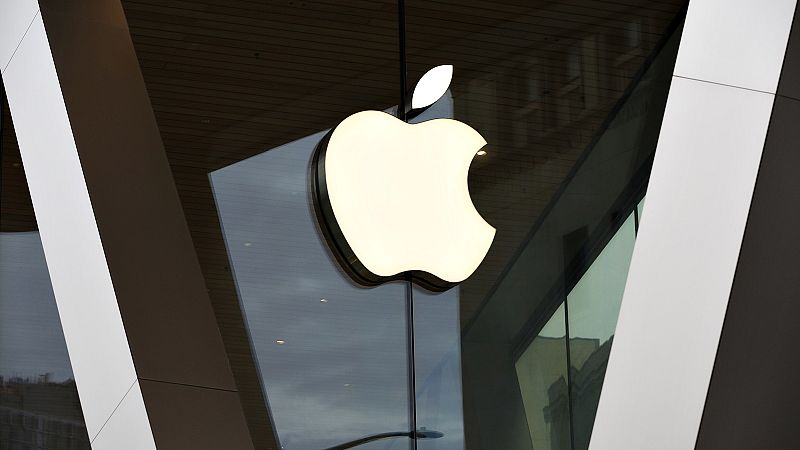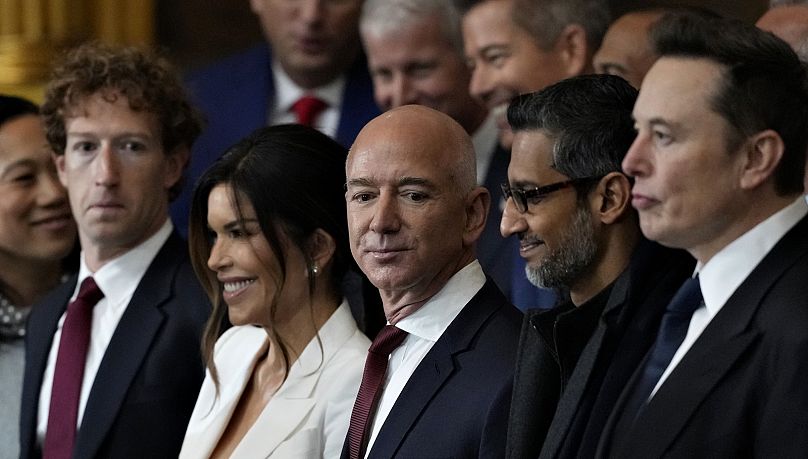
The European Union will not make any concessions on its digital and technology rules as part of any trade negotiations with the United States, Brussels has warned, drawing a red line after a senior advisor of President Donald Trump openly accused the bloc of waging "lawfare" against the country's Big Tech companies.
"As regards our European tech and digital regulation, we're talking about separate things here," a spokesperson for the European Commission said on Tuesday.
"And we will not be conflating the two in our negotiations with the US."
The accusation was made by Peter Navarro, a long-time Trump loyalist and one of the fiercest pro-tariff voices inside the White House, who wrote an op-ed in the Financial Times denouncing "the barrage of non-tariff weapons" used by foreign nations.
"These tools include currency manipulation, value-added tax distortions, dumping, export subsidies, state-owned enterprises, IP theft, discriminatory product standards, quotas, bans, opaque licensing regimes, burdensome customs procedures, data localisation mandates and, increasingly, the use of 'lawfare' in places like the EU to target America's largest tech firms," Navarro wrote.
"The US will now match substantially higher tariffs and crushing non-tariff barriers imposed on us by other nations. This is about fairness, and no one can argue with that," the article stated.
The Trump Administration has used the factors listed by Navarro to calculate the so-called "reciprocal tariffs", resulting in numbers that other countries do not recognise.
Trump has slapped the EU with a 20% rate, set to take effect on Wednesday. Officials in Brussels have dismissed the formula as "neither credible nor justified".
Additionally, the White House has published a 397-page report titled "Foreign Trade Barriers" that details the obstacles that, in its view, curb America's access to international markets. The chapter dedicated to the EU enumerates a string of "persistent barriers", such as sanitary and phytosanitary rules, restrictions on hormone-treated meat, language requirements in audiovisual services and government support for Airbus.
The document name-checks several pieces of legislation that the bloc introduced in recent years to regulate the online sphere, including the Digital Services Act (DSA), the Digital Markets Act (DMA), the Data Act and the Artificial Intelligence Act.
Silicon Valley has repeatedly complained about these rules and lobbied the Trump Administration to take a more assertive stance against Brussels to avoid multi-billion fines. Prominent Big Tech leaders were present at Trump's inauguration in January.
Apple, Meta and Alphabet are being investigated under the DMA, which focuses on correcting illegal practices that secure market dominance.
Meanwhile, X (formerly Twitter) is under closer scrutiny for possible non-compliance with the DSA, which addresses illegal content and disinformation. Meta's Instagram and Facebook services are also the subject of separate DSA probes.

Some of these proceedings are nearing an end and Brussels is expected to release its findings, potentially with fines, in the coming days or weeks. The internal process has coincided with the imposition of Trump's sweeping tariffs, fueling speculation that both issues will become inevitably interlinked in the ongoing negotiations.
But on Tuesday, after Navarro's broadside attack, the Commission claimed such an interlink would not happen and that tariffs and Big Tech would be dealt with on separate tracks. Officials insist the DMA and DSA proceedings are an obligation, rather than a choice, as they stem from enforcing the rules that co-legislators approved.
"There's a lot of noise, if you want to call it that, from Washington, sometimes from social media, sometimes it's in interviews. We have to stay really calm and focus on what's happening in terms of real policy," the spokesperson, Olof Gill, said.
Asked whether the other "non-tariff barriers" the White House has identified could be discussed during the talks, Gill said Brussels does not share the American assessment of "what constitutes a non-tariff barrier".
Non-tariff barriers traditionally refer to instruments such as licences, quotas, embargoes, bans and rules of origin that are aimed at reducing imports.
"We're very clear about what non-tariff barriers are and what they are not, and we will be making those points plain as day with the negotiations with the US," Gill said.
"We will not be compromising on our world-leading standards on food health and safety. Not with the Americans, not with anyone," he added.
Washington has taken particular aim at the value-added tax (VAT) that most countries around the world, including all 27 EU members, employ to collect revenue. The US is one of the few nations that does not have a VAT system in place.
In a recent interview the CNBC, Navarro sharply criticised VAT use. "Anybody who wants to come to us, talk to us about lowering your non-trade barriers," he said. "Vietnam has a 10% VAT. Europe has a 19% VAT. We cannot compete against that."
Europe does not have a unified VAT. Rates range from 17% to 27%.
Commission officials have tried to push back against the White House's VAT complaints, arguing the tax is non-discriminatory and applies to all products equally, be it EU-made or America-made. Removing VAT is seen as unfeasible because it would constrain public revenue for member states at a time of strained budgets and stagnant growth.
The red lines come a day after Trump rejected Ursula von der Leyen's offer to scrap tariffs on all industrial goods, urging the bloc to ramp up purchases of American energy.







